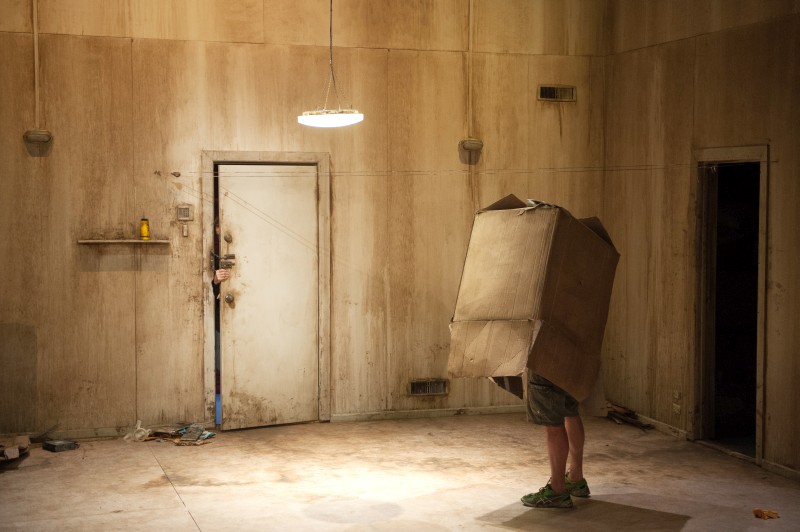 Everyone here is trapped. Welsh ex-squaddie Zach (David Woods) has retreated to a cardboard box. His wife Carol (Jon Haynes) is trapped out of sight, perhaps in her own box, perhaps upside down, certainly in an unforgiving marriage. Band mate and fellow war veteran Ieuan (Jon Haynes again) is trapped outside by the door-chain and by the demands of his bowels. It doesn’t take long, in this off-kilter world, for the audience to recognize its own position: trapped in a similarly dark box to Zach’s, on hard seats, in a cold auditorium. And hold on, aren’t the actors also hiding from us, literally, behind scenery and inside cardboard?
Everyone here is trapped. Welsh ex-squaddie Zach (David Woods) has retreated to a cardboard box. His wife Carol (Jon Haynes) is trapped out of sight, perhaps in her own box, perhaps upside down, certainly in an unforgiving marriage. Band mate and fellow war veteran Ieuan (Jon Haynes again) is trapped outside by the door-chain and by the demands of his bowels. It doesn’t take long, in this off-kilter world, for the audience to recognize its own position: trapped in a similarly dark box to Zach’s, on hard seats, in a cold auditorium. And hold on, aren’t the actors also hiding from us, literally, behind scenery and inside cardboard?
So the form matches the subject – Zach can’t find a way to escape the cage of his trauma – would mind-altering drugs help?
The story unfolds in Ridiculusmus’s signature style. We have two main quarrelsome characters, in a bizarre situation, struggling to debate a serious issue, this time about the use of mind-altering drugs such as MDMA to treat post-traumatic stress disorder.
Give Me Your Love is the second play of the company’s trilogy exploring the relationship between therapeutic innovation and mental health service users. The first, The Eradication of Schizophrenia in Western Lapland, was more ambitious in terms of staging and company size, but they share a basis in scientific research partnered with playful theatrical treatment. There are overlaps too in the way drama builds, and how catharsis has to be almost forced from the sufferer.
For Zach, ‘getting the trauma out’ is really hard. He’s tried Prolonged Exposure and it didn’t help. Does he need a therapist, like Ieuan had? Would listening to the Prodigy help? He understands that he can’t stay in a box for much longer, and if CNN said MDMA can help, and if they’ve tried it in Cardiff, then hell yes he’ll swallow the pill. But Zach is slippery. We can’t be certain that he has taken the drug, he invents a traumatic scene to get things moving, he says that his trauma is that he did nothing in the war, just sat on his ‘fat arse’. It’s almost as if his trauma is a fear of modern life; of doing nothing, being bored, feeling trapped. The language is classic Ridiculusmus, conversational and distinctive, slyly mixing the everyday with the metaphysical. An exchange about a Swiss Army Knife versus Leatherman leads seamlessly into a discussion on suicide; Ieuan drops in the line ‘keep them entertained, Zach’ acknowledging our presence.
If this sounds a bit grim, the performances and the writing prove otherwise. It’s almost an installation piece, this room with an animated box and choreographed motifs; Ieuan’s hands arcing gracefully through the gap in the door, Jon’s sudden appearance as a shell-shocked war veteran in white pants under a strobe light (lighting by Richard Vabre); the blatantly unnecessary use of a pulley as a dramatic device. The set, by Jacob Williams, looks like a cross between a condemned cell and a student squat, with a nod to a dirty protest. Having your actors either off-stage or concealed doesn’t help with audibility though, and some dialogue was very muffled.
The lack of physical presence does reduce the pleasure a notch for those who particularly enjoy Woods’s edgy explosive persona and Haynes’s dead-pan, slightly wheedling one. But Zach and Ieuan are well drawn despite being mainly invisible. We feel Zach’s frustration and readiness to try anything to escape his mental prison. Ieuan seems a bit of a chancer, but he is a proper friend and eager to help – even to procuring illegal ecstasy of dodgy provenance. I love that he doesn’t realize that Zach is in a box until very near the end. Carol, the off-stage wife, is beautifully sketched, perhaps with an addiction to painkillers and problems of her own. The action is punctuated with a fantastic sound design and music by Marco Cher-Gibard that underpins Zach’s emotional journey. The final coda, playing out in darkness, is wonderfully haunting.
There is no definitive point of view on offer here; the play rather skitters over its subject despite the in-depth research embedded in it. But as with many Ridiculusmus shows, the work is intrinsically dramatic. From Tough Time, Nice Time (performed in a bath tub), Yes, Yes, Yes (performed as two psychiatric patients) through to Say Nothing (performed on a piece of fake grass), Ridiculusmus continually reinvent theatre and speak with a unique voice.
Give Me Your Love ends with a glimmer of hope. Zach has had some kind of epiphany, however temporary. There is birdsong, a planned trip to the beach with an umbrella, the promise of an all-you-can-eat-buffet. But there is a sense too of hopelessness. Larger MDMA trials will start soon in America, but the UK is slow to invest in this form of therapy. So for Zach, and the one in nine soldiers that, it is said, suffer from post-traumatic stress disorder, the psychedelic trip-cure is still a long way down the rainbow-coloured road.
